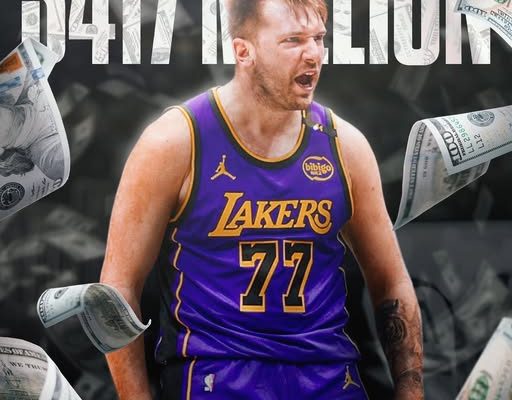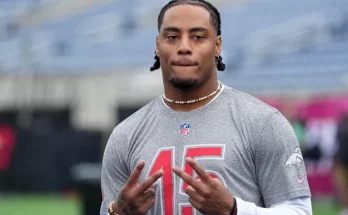When Luka Dončić put pen to paper on his extension with the Los Angeles Lakers, the NBA world felt a seismic shift that signaled not only a continuation of basketball brilliance but also the setting of a new precedent in superstar economics. Dončić, already one of the most gifted players of his generation, has aligned his future with the most glamorous franchise in basketball history. But buried beneath the surface of the contract’s current impact lies a financial cliffhanger that’s already turning heads: Luka Dončić is now eligible to sign a five-year, \$417 million deal once his current extension concludes. That figure doesn’t just represent a staggering sum of money—it redefines the ceiling for what generational talent can earn in the NBA’s new financial era.
The mere possibility of Dončić eventually commanding a \$417 million contract cements him as the face of a league shifting toward mega-max deals tethered to performance, market appeal, and long-term strategic value. Dončić isn’t just a player; he’s a global brand, a basketball savant, and a business investment all rolled into one. The Lakers understood this when they orchestrated a dramatic extension that brought him to Los Angeles and placed him alongside other stars on the grandest stage in the sport. But by structuring the deal with financial and timing flexibility, both Dončić and the Lakers have set themselves up for what could be the most lucrative individual contract in NBA history once his extension concludes.
The mechanics of this possibility stem from a combination of the NBA’s rising salary cap, Dončić’s All-NBA resume, and the CBA’s Designated Veteran Player rules, often referred to as the “supermax.” Players who meet certain accolades—such as making an All-NBA team in recent years—can sign deals worth up to 35% of the salary cap if they re-sign with their current team. With league revenue soaring thanks to global expansion, media rights deals, and digital monetization, that 35% will soon be worth more than ever. If projections hold, the cap will swell to such an extent by the time Dončić’s current deal expires that a five-year, \$417 million contract would be both allowable and justifiable under the league’s framework.
For the Lakers, this development represents both an opportunity and a challenge. On one hand, securing Luka for potentially the next decade positions the franchise for sustained relevance and championship contention. On the other hand, it places enormous financial pressure on the front office to manage the books wisely, build a competitive roster around such a massive contract, and avoid being hamstrung by luxury tax penalties. But if there’s a franchise that can make it work, it’s the Lakers. With their global brand, unrivaled revenue streams, and deep-pocketed ownership group, Los Angeles is uniquely equipped to build around a supermax centerpiece like Dončić.
For Luka himself, the road ahead is as much about legacy as it is about money. Sure, \$417 million is an unfathomable number for most, but for Dončić, it symbolizes something greater: staying power. The players who command those kinds of deals aren’t just scorers or highlights—they’re pillars of the league. He would be joining the company of players like Stephen Curry, Giannis Antetokounmpo, and Nikola Jokić, all of whom have or will command contracts in the \$300M–\$400M range depending on market growth and their accolades. But none of them may quite match the unique fusion of flair, fan engagement, and statistical dominance that Dončić brings.
This kind of forward-looking financial forecast also sheds light on how Dončić’s game has aged like fine wine. Still only in his mid-20s, he has achieved what most players dream of in a career. He’s an All-NBA regular, a scoring machine, a rebounding guard, and perhaps the most gifted passer since Magic Johnson. His playoff performances have been nothing short of spectacular, and his ability to shoulder entire offenses while elevating his teammates has made him a generational force. Now, he’s getting paid like one—and soon, he may be paid more than anyone before him.
What separates Dončić from other stars eligible for a supermax is how complete his résumé already is and how much runway he still has. The potential \$417 million deal would kick in once his current contract concludes, meaning he’ll still be in his prime when it begins. That’s unprecedented. Typically, players become eligible for their biggest contracts just as their peak years are winding down. In Luka’s case, the Lakers could be locking in a five-year window of uninterrupted MVP-level basketball during his late 20s to early 30s.
Financially, it also signals the dawn of a new reality in the NBA marketplace. Front offices across the league are now planning for the inevitability of paying \$80 million annually to retain a top-five player. That wasn’t conceivable just five years ago. In that time, the league’s economics have ballooned to the point where today’s \$50 million contracts feel modest. Luka’s prospective deal, breaking the \$400 million threshold, marks a new epoch where every team must reckon with how to structure their cap space around megastars while still fielding depth.
From a fan perspective, the extension and the looming \$417 million possibility add fuel to the Luka-Lakers excitement engine. He’s in the Hollywood spotlight now, with opportunities for branding, endorsements, and legacy-building off the court that are unmatched anywhere else. Every playoff run, every MVP campaign, every deep shot from 35 feet out carries added weight because of where he’s playing and the financial stakes that now surround his future. Luka has never shied away from the moment, and now he’s staring at the possibility of becoming the highest-paid player in league history.
The timing couldn’t be more perfect for the Lakers either. With LeBron James winding down his career and Anthony Davis needing a long-term partner-in-crime, Dončić fits the bill. He can take the torch from LeBron and lead the next generation of Lakers basketball, keeping the franchise in title contention while bridging the past with the future. The possibility of giving him a \$417 million deal is a price they’ll happily pay if it means continued success and a guaranteed superstar anchoring their roster.
There’s also the broader question of how this impacts the league’s power dynamics. If the Lakers can secure Luka long-term and keep him healthy and happy, it sets a new standard for player movement and financial planning. Other franchises will have to adjust. Some may try to imitate the Lakers’ blueprint: trade for a young superstar, extend him early, and structure the deal so that a supermax remains possible once the extension expires. Others may double down on developing in-house talent, fearful that the market for elite players is shifting too far beyond reach.
But for now, all eyes remain on Dončić, the Lakers, and the unprecedented future they are charting together. The \$417 million number is as symbolic as it is literal—it’s the price of generational talent in the modern NBA. It’s the reward for excellence, marketing power, and consistency. And most of all, it’s a declaration that Luka Dončić, despite all he’s already accomplished, is only getting started.



